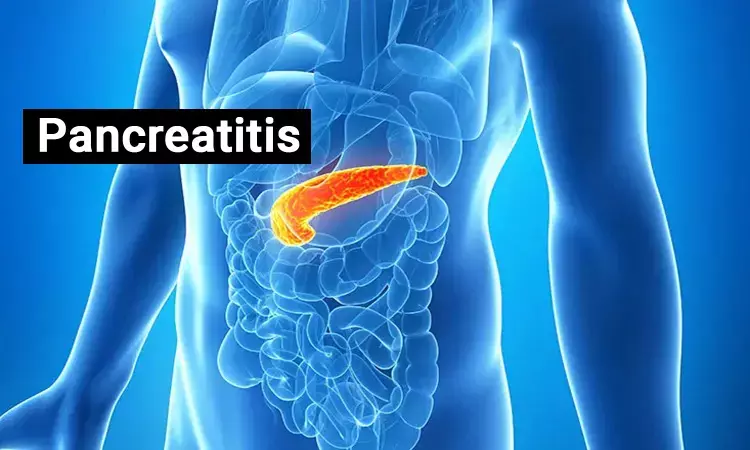- Home
- Medical news & Guidelines
- Anesthesiology
- Cardiology and CTVS
- Critical Care
- Dentistry
- Dermatology
- Diabetes and Endocrinology
- ENT
- Gastroenterology
- Medicine
- Nephrology
- Neurology
- Obstretics-Gynaecology
- Oncology
- Ophthalmology
- Orthopaedics
- Pediatrics-Neonatology
- Psychiatry
- Pulmonology
- Radiology
- Surgery
- Urology
- Laboratory Medicine
- Diet
- Nursing
- Paramedical
- Physiotherapy
- Health news
- Fact Check
- Bone Health Fact Check
- Brain Health Fact Check
- Cancer Related Fact Check
- Child Care Fact Check
- Dental and oral health fact check
- Diabetes and metabolic health fact check
- Diet and Nutrition Fact Check
- Eye and ENT Care Fact Check
- Fitness fact check
- Gut health fact check
- Heart health fact check
- Kidney health fact check
- Medical education fact check
- Men's health fact check
- Respiratory fact check
- Skin and hair care fact check
- Vaccine and Immunization fact check
- Women's health fact check
- AYUSH
- State News
- Andaman and Nicobar Islands
- Andhra Pradesh
- Arunachal Pradesh
- Assam
- Bihar
- Chandigarh
- Chattisgarh
- Dadra and Nagar Haveli
- Daman and Diu
- Delhi
- Goa
- Gujarat
- Haryana
- Himachal Pradesh
- Jammu & Kashmir
- Jharkhand
- Karnataka
- Kerala
- Ladakh
- Lakshadweep
- Madhya Pradesh
- Maharashtra
- Manipur
- Meghalaya
- Mizoram
- Nagaland
- Odisha
- Puducherry
- Punjab
- Rajasthan
- Sikkim
- Tamil Nadu
- Telangana
- Tripura
- Uttar Pradesh
- Uttrakhand
- West Bengal
- Medical Education
- Industry
Delayed surgical step-up approach best for treating necrotizing pancreatitis: Study

China: A delayed surgical step-up approach (DSU) is the optimal strategy for treating necrotizing pancreatitis, says a recent study.
The findings from a meta-analysis of randomized controlled trials (RCTs) were published in the World Journal of Emergency Surgery on January 27 2023. In clinical practice, the researchers suggest avoiding drainage alone.
The study further found that any interventions should be postponed for at least four weeks. The findings might help clinicians choose the optimal treatment strategy in clinical practice.
Acute pancreatitis (AP) is a pancreas' inflammatory disorder with 10% to 40% mortality. Two significant forms of acute pancreatitis exist: necrotizing and interstitial. About 20% of acute pancreatitis patients advance to necrotizing pancreatitis (NP), which is linked with walled-off necrosis (WON) or acute necrotic collections (ANC), with a significant mortality risk of 20–30%. Intervention is required in 40–63% of patients who develop necrotizing pancreatitis.
A series of randomized controlled trials have examined the safety and efficacy of different things and methods of interventions. However, there still needs to be a consensus on the optimal treatment strategy. Considering this, Yang Yang, Tianjin Medical University, Tianjin, China, and colleagues conducted a comprehensive Bayesian network meta-analysis (NMA) of RCTs to determine the optimal intervention and timing for necrotizing pancreatitis comparing safety and efficacy through direct and indirect evidence.
For this purpose, the researchers searched the online databases until November 30, 2022. A systematic review and Bayesian NMA were performed following the PRISMA guidelines. Trials that compared different treatment strategies for NP were included.
The authors analyzed ten studies comprising 570 patients and eight treatment strategies.
The study led to the following findings:
- The researchers identified no statistically significant differences comparing odds ratios, but the surface confirmed the trends under the cumulative ranking (SUCRA) scores.
- The interventions having a low rate of mortality included delayed surgical step-up approach (DSU), delayed surgery (DS), and delayed endoscopic step-up approach (DEU). In contrast, the interventions with a low rate of significant complications were DEU, DSU and DS.
- According to the clustered ranking plot, DSU was overall superior in lowering mortality and major complications, while delayed drainage performed the worst.
- Analysis of the secondary endpoints confirmed DEU and DSU's superiority concerning individual components of major complications (pancreatic fistula, organ failure, bleeding, and visceral organ or enterocutaneous fistula), endocrine insufficiency, exocrine insufficiency, and length of stay. Overall, DSU was superior to other interventions.
"The network meta-analysis on comparing the outcomes of 8 interventions for NP across ten studies with a total of 816 patients identified the optimal treatment strategy for NP with low risk of major complications and mortality as DSU," the researchers wrote.
"Our findings indicated that postponement strategy interventions and step-up approach, usually selected in the current clinical practice, were reasonable," they conclude.
Reference:
Yang, Y., Zhang, Y., Wen, S. et al. The optimal timing and intervention to reduce mortality for necrotizing pancreatitis: a systematic review and network meta-analysis. World J Emerg Surg 18, 9 (2023). https://doi.org/10.1186/s13017-023-00479-7
Dr Kamal Kant Kohli-MBBS, DTCD- a chest specialist with more than 30 years of practice and a flair for writing clinical articles, Dr Kamal Kant Kohli joined Medical Dialogues as a Chief Editor of Medical News. Besides writing articles, as an editor, he proofreads and verifies all the medical content published on Medical Dialogues including those coming from journals, studies,medical conferences,guidelines etc. Email: drkohli@medicaldialogues.in. Contact no. 011-43720751


